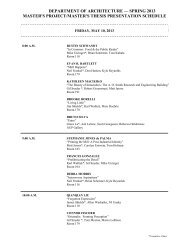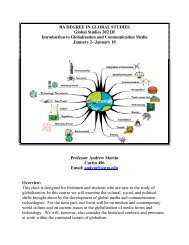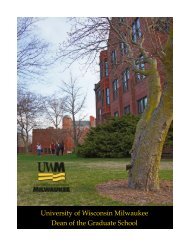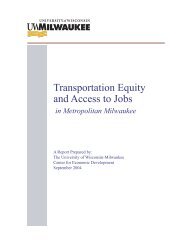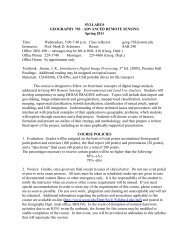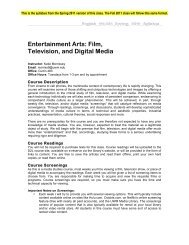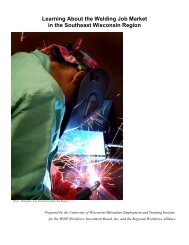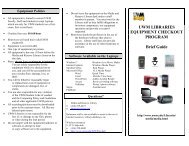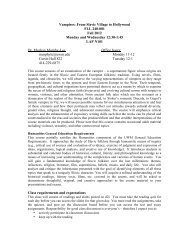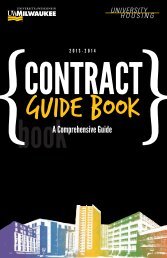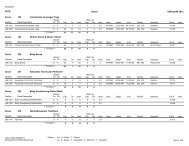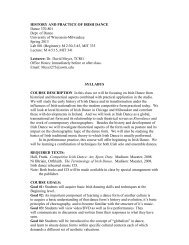FALL 2008 - UW-Milwaukee
FALL 2008 - UW-Milwaukee
FALL 2008 - UW-Milwaukee
You also want an ePaper? Increase the reach of your titles
YUMPU automatically turns print PDFs into web optimized ePapers that Google loves.
<strong>UW</strong>interiM class at the Katrina Memorial in New Orleans’ Lower Ninth Ward.Following their return from NewOrleans, students were energized bytheir participation in the courses.Together, they organized a commun ityevent, “Have We Forgotten NewOrleans?” The event, held on April30, <strong>2008</strong>, included presentations fromstudents Erica Lehr and Larry Adams,and music by a Lower Ninth Wardensemble, The Free Agents BrassBand. This event was coupled with thephotography exhibit on the MardiGras Indians at the <strong>UW</strong>M Union ArtGallery.Following on the heels of the“Have We Forgotten New Orleans?”presentation, Ajirotutu has reachedout to <strong>UW</strong>-Waukesha in September,screened “Trouble the Water” — adocumentary about the hurricane’seffects on New Orleans — and cosponsoredDanny Glover’s visit to<strong>UW</strong>M in November. Glover, an actorand human rights activist, is also one ofthe co-producers of “Trouble theWater.”The <strong>UW</strong>interiM New Orleanscourses are consistent with ProvostCheng’s efforts to expose <strong>UW</strong>Mstudents to wider cultural andgeographic exper iences. Ajirotutuexplains that “we always talked aboutgetting students out of the city.Initially, we thought of that in termsof inter national travel. I think theNew Orleans program offers us anopportunity to give students similarkinds of experience within thedomestic space of the United States.”In addition to exposure and understandingof diverse cultural experiences,the connections made with New Orleanshave a socio-political mission as well.The Cultures and Com mun itiesProgram has hosted the DifficultDialogues and Common Groundprograms since Hurricane Katrina inorder to “energize activism on a locallevel — so that we begin to realize thatthere are things we need to do here”in <strong>Milwaukee</strong>. Through courses andcollaborations, students, researchers,and activists become part of a “braidedconversa tion” about the needs ofcommunities far away and close at hand.Ajirotutu’s perspective on “Katrina”looks into the sources of the city’s devastation and inequalities so that similarinvestigations and social activism can beapplied in the researchers’ own communities. “What makes sense is that ifthey looked at New Orleans and cameback and recognize the same demographicshere in <strong>Milwaukee</strong>, then they’llrealize that many cities in this countryare Katrinas just waiting [to happen].We may not have water coming through,but there are other economic factors,or social factors, that may equally be asdevastating.”As the <strong>UW</strong>interiM New Orleanscourses expand through collaborationwith depart ments and social andaca dem ic events on campus, moreparallels will be discovered betweenthe economic and social conditionsof poverty in <strong>Milwaukee</strong> and in theCrescent City.The Free Agents BrassBand performed at the“Have We ForgottenNew Orleans?” eventin April <strong>2008</strong>.Fall <strong>2008</strong>/Myriad 11



